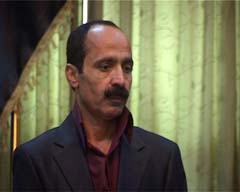Iraq’s Defense Ministry has announced that several residents of Camp Ashraf have fled the camp and appealed to Iraqi military forces for help.
Camp Ashraf, which is located some 60 kilometers from Baghdad and 100 kilometers from the border with Iran, is home to some 3,500 members of the Iranian opposition group Mujahedin-e Khalq Organization (MKO, aka People’s Mujahedin of Iran). Iran has banned the group, and like the United States, considers it a terrorist organization. Iraq has said the camp must go.
Last week, 34 camp residents were killed during a raid by Iraqi forces under circumstances that are not clear.
The MKO says camp residents were killed by Iraqi forces. The Iraqi government, however, says it believes about 30 people were shot dead by guards at the camp.
The UN and rights groups have called for an independent investigation into the deaths.
Amnesty International has said that video clips of the April 8 clashes that the MKO has uploaded to YouTube appear to show Iraqi soldiers indiscriminately firing into the crowds and using vehicles to try and run others down.
Iraq’s Defense Ministry said that three MKO leaders were among the camp residents who escaped.
On April 19, Defense Ministry spokesman Muhammad al-Askari reportedly told a press conference in Baghdad that "three leaders of the People’s Mujahedin of Iran managed to escape Camp Ashraf." He named them as "senior leader Maryam Sinjari, leader Abdul Latif Shardouri [Abdollatif Shadvari], and leader Ibrat Kikhai."
I interviewed Shadvari last week. He told me he escaped from Camp Ashraf two months ago and turned himself in to Iraqi forces. He also said some of the other residents of the camp were being held there against their will.
Former MKO members have described the group as a cult that promotes celibacy and martyrdom, takes away members’ children, and uses psychological methods to pressure members and force them to remain obedient and follow orders.
The MKO has rejected the claims and accuses former members of being tools of Tehran.
Shadvari, who spoke to me from Baghdad where he said he’s staying at a hotel, said he joined the MKO when he was 15 years old. Here’s some of our conversation:
Persian Letters: Can you tell me something about yourself and describe how you came to join the Mujahedin-e Khalq Organization?
Abdollatif Shadvari: My name is Abdollatif Shadvari, I’m from Baluchistan. I’ve been with this organization for 25 years. I joined the MKO from Pakistan and through a friend who has been martyred.
I haven’t had any contact with my family during the [past] 25 years because there was no possibility of contacting them. My family thought I was dead. Using the telephone, mobile phone, Internet, and even listening to radio is forbidden in the organization.
During these 25 years I was under a lot of pressure and I decided to hand myself over to Iraqi forces. I did that two months ago and now I’m at a hotel. I’ve been in touch with the Red Cross and also with the Iraqi government. I hope to go to another country.
Persian Letters: Do you know which country you might go to? What will be your situation once you get there?
Shadvari: I’m supposed to discuss it with the Red Cross and the United Nations. The issue is, as [MKO leader Massoud] Rajavi has said many times, whoever wants to escape from Ashraf will be punished with death and execution. Not only me, but many of my friends who are now in Ashraf don’t have the possibility to leave the camp. Escape is the only way.
Escaping from there requires two or three months of preparation. I thought a lot about it and planned it so I could finally escape. [MKO leaders] always tell us: "You can’t enter any [other] country. Ashraf is the only place you have."
Persian Letters: Are you saying that some people are held in Ashraf against their will? They’re forced to stay there?
Shadvari: Yes, many are under pressure. They’re worried about their future; they don’t know what will be with them. I call on the Red Cross and international organizations to talk with each of the camp residents individually. This issue must be solved and the bloodshed must be stopped.
Persian Letters: Why do you think the MKO wants to keep people in Camp Ashraf? Why don’t they let those who don’t want to be there go?
Shadvari: It’s obvious. If people [leave Ashraf], the organization will fall apart, there won’t be any Mujahedin-e Khalq Organization anymore.
Persian Letters: Are you married?
Shadvari: No. I was 15 when I joined the organization. Now I’m 40.
Persian Letters: Why didn’t you get married? Was it your choice?
Shadvari: Getting married is banned in Camp Ashraf. Not only getting married, but talking to women is banned.
Golnaz Esfandiari, Persian letters, Radio Free Europe

